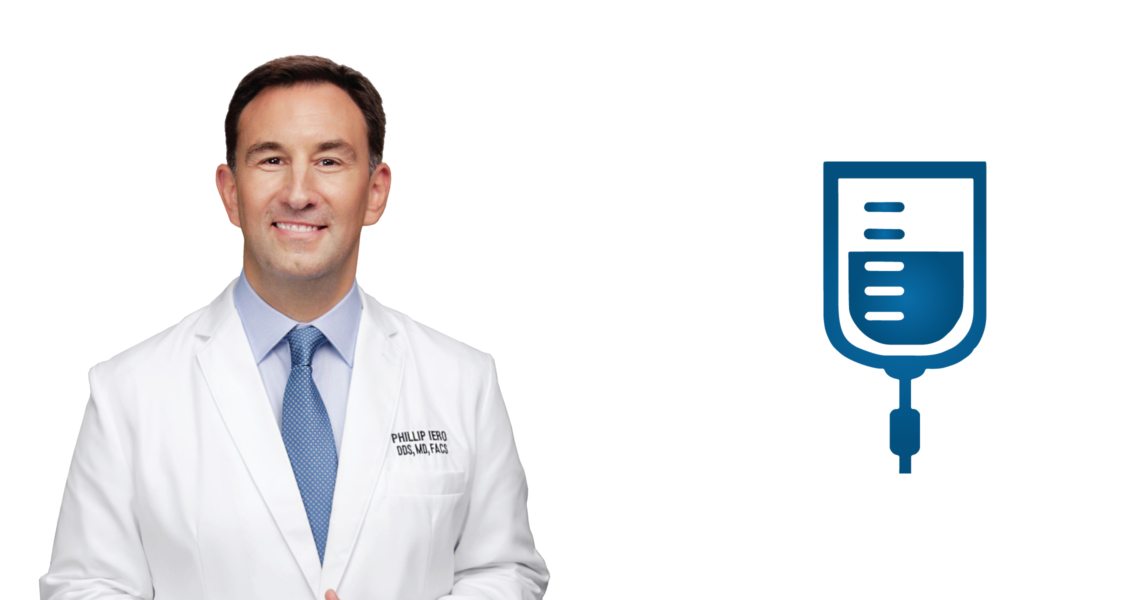At Bellaire Facial, Oral & Dental Implant Surgery, your safety and comfort are our top priority. We offer a variety of anesthesia options to our patients, and our oral surgeon has undergone extensive training to be able to safely administer all forms of sedation. Your options include local anesthesia, nitrous oxide sedation, IV sedation, and general anesthesia. Dr. Iero will discuss all the details of your sedation options with you at your consultation appointment, but you can read general information about each one below.
Types of Anesthesia
Local Anesthesia
If you’ve ever had a minor procedure at the dentist, such as a filling, then you’ve probably had an experience with local anesthesia. Your doctor will apply the local anesthesia directly to the surgical site, and it will act as a numbing agent, preventing the patient from feeling any pain or discomfort while remaining conscious during the procedure. In many cases, local anesthesia is used in conjunction with other sedation methods, such as nitrous oxide.
Nitrous Oxide
Nitrous oxide, more commonly known as laughing gas, allows patients to enter a relaxed state by inhaling the anesthesic through a breathing apparatus. They remain conscious, but they are much less aware of their surroundings. Nitrous oxide is generally used in combination with other forms of sedation, such as local or IV anesthesia. It wears off quickly and doesn’t leave any lingering effects.
Intravenous (IV) Sedation
IV sedation is common for slightly more involved procedures, such as wisdom teeth removal. Patients receive the sedation through an intravenous line in the arm. The anesthesia allows patients to enter twilight sedation, meaning they can sleep comfortably throughout the procedure without experiencing discomfort. Many patients report not even remembering their procedure when they wake up.
General Anesthesia
General anesthesia is generally only uses for complex procedures, such as orthognathic surgery or facial trauma treatment. However, it is also available to patients who suffer from severe anxiety about surgical procedures. With general anesthesia, patients remain completely asleep for the entire duration of the surgery. Most of the time, general anesthesia is administered in a hospital setting.
Exparel® for Long-Lasting Pain Relief
Bellaire Facial, Oral & Dental Implant Surgery works hard to safeguard our patients’ health and comfort, keeping up to date on the best ways to provide pain relief with the least amount of risk. We are proud to offer the non-addictive, opioid-free pain control medication Exparel to our surgical patients. Exparel is a proven pain-relieving medication that is administered during surgery in one long-lasting dose. Effective non-opioid medications such as Exparel are quickly gaining recognition as the recommended new standard for improving recovery, reducing cost, and reducing or even removing the need for risky post-surgical prescription pain medications.
Why are opioid-based pain medications risky?
Opioid-based prescription pain medications, also called narcotics, are very similar to heroin in terms of how they work and their effects on the human body. For many years, the standard in post-surgical pain relief has been to prescribe opioid medication. This has led to an unfortunate opioid addiction crisis in our country:
- 1 out of 15 surgical patients progresses to long-term opioid use.
- More than 115 Americans die each day from opioid overdose.
- Rates of prescription drug misuse are particularly high in Texas, home to 4 of the top 25 cities in the U.S. for opioid abuse.
Narcotics have a very high risk of dependence for anyone, anywhere, at any age. By offering highly effective non-opioid pain control, Dr. Iero hopes to keep his patients safe from the risk of post-surgical opioid dependence.
How does Exparel work?
Exparel is designed to provide extended analgesia, which means that it numbs the pain in the area on your body where your surgery is performed by slowly releasing medication (an opioid-free local anesthetic called bupivacaine). The slow release of this medication allows Exparel to give you long-lasting pain relief after surgery with just a single dose. Exparel starts working during your surgical procedure and continues to work during your recovery, providing pain relief for several days. Some of the incredible benefits of Exparel include
- Long-lasting pain control. In clinical trials, patients who received Exparel have been shown to experience pain relief for several days after surgery. Many patients who opt for Exparel for their oral surgery procedure will not need to use an opioid medication for post-surgical pain. Their pain will be managed with Exparel alone.
- No risk of dependence. Exparel offers highly effective post-surgical pain control without the risk of dependence. Exparel is not a narcotic and is not addictive.
- No prescription hassles. Exparel is administered during your surgical procedure and continues to work throughout recovery, so you are less likely to need to trouble yourself with expensive and inconvenient prescriptions.
- Less risk of side effects. Exparel is administered in a single dose, limiting the amount of medicine you need and therefore limiting the risk for side effects.
If you would like to learn more about how Exparel provides long-lasting pain control while reducing the need for opioid medication after your oral surgery, please contact Bellaire Facial, Oral & Dental Implant Surgery to schedule a consultation. Dr. Iero will be happy to discuss adding this medication to your surgical treatment plan.
Anesthesia at Bellaire Facial, Oral & Dental Implant Surgery
Oral and maxillofacial surgeons are the highest qualified dental professionals to perform anesthesia. They are required to complete a minimum four-year residency, during which they train alongside licensed anesthesiologists to learn about safe administration. If you have any more questions about our anesthesia options, we encourage you to contact our office.

